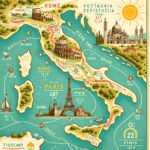The best way to travel from Paris to Italy is by finding the most convenient and affordable mode of transportation. Whether you’re drawn to the rich history, culture, or culinary delights of Italy, planning your journey from Paris requires careful consideration of various travel options.
From the convenience of train travel to the speed of air travel, there are different choices to suit every traveler’s needs. This article will explore the best ways to travel from Paris to Italy, providing insights into train, plane, car, and bus travel options as well as tips for combining multiple modes of transportation.
When it comes to traveling from one European gem to another, the allure and excitement are undeniable. However, finding the best way to reach your destination is essential for a smooth and enjoyable journey.
In this article, we’ll delve into the advantages and disadvantages of each mode of transportation from Paris to Italy. As every traveler has unique preferences and priorities, understanding the various options can help you make an informed decision about how best to navigate your way between these two popular destinations.
Whether you prioritize comfort, cost-effectiveness, or flexibility in your travels, identifying the most suitable mode of transportation from Paris to Italy is crucial. The journey should be just as memorable as arriving at your final destination – and choosing the right means of getting there plays a significant role in shaping that experience. Join us as we uncover the key factors for making this journey an unforgettable part of your European adventure.
Travel by Train
Traveling by train from Paris to Italy offers a convenient and comfortable way to experience the journey between these two iconic European destinations. There are several options for train travel, each with its own advantages and disadvantages. Here are some important points to consider when choosing train travel:
- Convenience and comfort: One of the main reasons travelers opt for train travel is the convenience and comfort it provides. Trains offer spacious seating, the ability to move around during the journey, and often scenic views along the route.
- Different train options: There are various types of trains that connect Paris to Italy, including high-speed trains, overnight sleeper trains, and regional trains. High-speed trains such as the TGV and Thello provide quick connections between major cities like Paris, Milan, Venice, Florence, and Rome.
- Advantages and disadvantages: While train travel can be convenient and enjoyable, it may not always be the fastest option for reaching certain destinations in Italy. Additionally, travelers should consider factors such as ticket prices, availability of direct routes, and potential need for transfers when assessing the pros and cons of choosing train travel.
Overall, traveling by train from Paris to Italy is a popular choice for those looking for a relaxing and scenic way to reach their destination. With different types of trains available and various routes connecting major cities in both countries, it’s essential for travelers to weigh their priorities in terms of speed, comfort, and affordability when deciding on this mode of transportation.
Travel by Plane
When it comes to traveling from Paris to Italy, taking a plane is one of the fastest and most convenient options. There are several airlines that offer flights between the two countries, providing travelers with a range of choices for their journey. Some of the major airlines that operate flights between Paris and various cities in Italy include Air France, Alitalia, EasyJet, and Ryanair. These airlines offer both direct and connecting flights, catering to different travel preferences and schedules.
Pros of choosing air travel:
- Speed: Taking a flight from Paris to Italy significantly reduces travel time compared to other modes of transportation.
- Comfort: Flights provide passengers with comfortable seating and amenities for a more relaxing travel experience.
- Variety of options: With multiple airlines operating on this route, travelers can find competitive pricing and convenient flight schedules.
Cons of choosing air travel:
- Airport transfers: Getting to and from airports can add complexity and additional expenses to your journey.
- Baggage restrictions: Airlines often have limitations on baggage allowance which may require additional fees for extra luggage.
- Environmental impact: Air travel has a greater carbon footprint compared to other transportation options.
Tips for finding affordable flights:
- Use flight comparison websites to compare prices across different airlines and booking platforms.
- Be flexible with your travel dates to take advantage of cheaper fares during off-peak times.
- Consider flying into smaller airports in Italy for potential cost savings on airfare.
Overall, traveling by plane from Paris to Italy is a great option for those looking for speed and convenience. However, it’s important for travelers to weigh the pros and cons before making their decision, taking into account factors such as cost, time constraints, and personal preferences.
Travel by Car
Traveling from Paris to Italy by car offers a sense of freedom and flexibility that other modes of transportation may not provide. With the option to stop and explore charming towns along the way, taking a road trip can be an unforgettable adventure. However, there are several considerations when choosing to travel by car, including tolls, gas, and parking.
One advantage of traveling by car is the ability to plan your own route and take detours as desired. This allows for potential sightseeing opportunities and the chance to experience a more authentic taste of local culture in smaller towns. Additionally, having access to a vehicle in Italy can make it easier to reach destinations off the beaten path.
On the other hand, there are some drawbacks to traveling from Paris to Italy by car. Long driving distances and navigating unfamiliar roads can be tiring and stressful for some travelers. Additionally, parking in larger cities like Rome or Milan may be expensive and limited. It’s important to weigh these factors and consider your comfort level with driving long distances in a foreign country before choosing this mode of transportation.
| Advantages | Considerations |
|---|---|
| Flexibility | Parking limitations in cities |
| Sightseeing opportunities | Fatigue from long drives |
| Access to off-the-beaten-path destinations | Navigating unfamiliar roads |
Travel by Bus
Traveling by bus is another convenient and cost-effective option for those looking to journey from Paris to Italy. There are several bus companies that offer routes between these two popular travel destinations, providing a budget-friendly alternative to train or plane travel.
While it may not be the quickest mode of transportation, traveling by bus allows for a scenic journey through the picturesque countryside, making it an attractive option for travelers who enjoy taking in the sights along the way.
One of the main advantages of traveling by bus is the affordability, as bus tickets are often less expensive than train or plane tickets. Additionally, buses may provide direct routes to certain Italian destinations that require multiple transfers when traveling by other modes of transportation. However, one drawback of traveling by bus is the longer travel time compared to air travel – a trip from Paris to Italy can take upwards of 12 hours by bus.
| Mode of Transportation | Advantages | Disadvantages |
|---|---|---|
| Train | Comfortable, convenient, scenic views | Somewhat limited schedules/routes |
| Plane | Fastest mode of travel | Potentially more expensive; airport transit required |
| Car | Flexibility, independence, sightseeing opportunities |
Ultimately,”If Trainers Only Knew” balances respect with challenges and offers practical tools that “no trainer should go without”.
Combining Multiple Modes of Transportation
When traveling from Paris to Italy, combining multiple modes of transportation can provide a unique and flexible way to explore both countries. By integrating train, plane, car, and bus travel, travelers can create a customized journey that meets their specific preferences and allows for diverse experiences along the way.
Advantages of Combining Modes of Transportation
One of the main advantages of combining multiple modes of transportation is the ability to maximize convenience and efficiency. For example, starting with a high-speed train from Paris to a major Italian city like Milan or Rome can provide a smooth and comfortable journey. From there, travelers can then consider taking short flights within Italy to reach more remote destinations or areas not easily accessible by train.
Alternatively, renting a car in Italy can allow for greater freedom in exploring the countryside and smaller towns at one’s own pace. By incorporating various modes of transportation, travelers can also avoid becoming too fatigued from long hours of travel on a single mode.
Another benefit of combining transportation methods is the opportunity for diverse experiences. Train travel offers scenic views and a relaxing atmosphere, while flying allows for rapid transit between distant destinations. Additionally, driving through the Italian countryside presents the chance to immerse oneself in local culture and discover hidden gems. By utilizing different means of transport, travelers have the chance to embrace various aspects of both France and Italy during their journey.
Challenges of Combining Modes of Transportation
Despite its advantages, combining multiple modes of transportation does come with some challenges. Coordinating schedules between different forms of travel can be complex and may require careful planning. It’s important to ensure sufficient layover times between transfers and consider potential delays that could impact connecting services. Additionally, navigating language barriers or unfamiliar customs when transitioning between different types of transport can present unique challenges when combined into one trip.
Furthermore, cost considerations should not be overlooked when considering mixed-mode travel. Ticket prices for trains, flights, rentals cars, buses, as well as associated expenses such as parking fees or tolls need to be carefully factored into one’s budget before embarking on a multi-transportation journey.
Ultimately,
combining multiple modes of transportation offers an exciting opportunity for adventurous travelers who are willing to embrace both the logistical challenges and rich experiences that come with it. It’s also important for travelers to weigh these factors against their individual comfort levels and priorities when planning their journey from Paris to Italy using this approach.
Considerations for Different Destinations in Italy
Direct Flights
When planning a trip from Paris to Italy, it’s essential to consider the specific destination within Italy. For travelers heading to popular cities like Rome, Florence, or Venice, direct flights are often available from Paris. This can be a convenient and time-saving option, especially for those looking to minimize travel time and maximize their time at the destination.
Train Connections
For those traveling to destinations within Italy that may not have direct flight options from Paris, train connections can be a convenient alternative. Italy boasts an extensive and efficient rail network, making it relatively easy to travel between cities by train. Travelers can take advantage of high-speed trains such as the Frecciarossa or Italo to quickly reach their Italian destination from major cities like Milan or Turin.
Driving Routes
For travelers looking for flexibility and the opportunity to explore more off-the-beaten-path destinations in Italy, renting a car and driving from Paris can provide a unique experience. However, when considering this option, it’s important to carefully plan driving routes and factor in travel time as well as potential tolls and parking fees along the way.
When considering different transportation options based on the destination in Italy, it’s important for travelers to weigh factors such as convenience, travel time, cost, and flexibility. By carefully considering these factors in relation to their specific Italian destination, travelers can make an informed decision about the best way to travel from Paris to Italy based on their individual preferences and priorities.
Conclusion
In conclusion, there are several transportation options for traveling from Paris to Italy, each with its own advantages and drawbacks. Traveling by train offers convenience and comfort, while air travel provides speed and efficiency.
Renting a car allows for flexibility and the opportunity to explore different sights along the way, while bus travel is cost-effective but may come with longer travel times. For some travelers, it may be beneficial to combine multiple modes of transportation to create a unique and versatile travel experience.
Ultimately, the best way to travel from Paris to Italy depends on individual preferences, budget, and destination within Italy. For those heading to major cities like Rome or Florence, direct flights or train connections may be the most efficient option. However, for those looking to explore off-the-beaten-path destinations or enjoy a scenic road trip through the Italian countryside, renting a car or taking a combination of trains and buses could be the ideal choice.
No matter which transportation option is chosen, it’s important for travelers to carefully consider their needs and priorities before making a decision. Whether seeking affordability, comfort, flexibility, or efficiency, there is a suitable travel option available for every type of traveler looking to journey from Paris to Italy.
Frequently Asked Questions
Is there a direct train from Paris to Italy?
There are direct trains that run from Paris to Italy, specifically to major Italian cities such as Milan, Turin, and Venice. These high-speed trains provide a convenient and comfortable option for traveling between the two countries without the need for layovers or transfers.
What is the best way to get from France to Italy?
The best way to get from France to Italy ultimately depends on individual preferences and travel priorities. For those looking for a fast and direct route, taking a high-speed train from Paris to Italy may be the most efficient option.
However, flying is also a popular choice for travelers who want to save time and cover long distances quickly. Other options include driving or taking a bus, though these modes of transportation may take longer and require additional planning.
What is the most effective way to travel to Italy?
The most effective way to travel to Italy largely depends on one’s starting point, budget, and personal preferences. For example, if time is of the essence, flying may be the quickest option; however, taking into account factors such as cost, convenience, and environmental impact might lead one trip being more practical than another at any given time.
Ultimately it pays for travelers to weigh their options before making final reservations so they can make an informed decision based on individual circumstances.

I’m a passionate traveler, writer, and Italophile. My fascination with Italy’s history, art, and culture has led me on countless adventures across the Italian landscape. Through “I Live Italy,” I share my love for this extraordinary country and aims to inspire others to explore its boundless beauty.





